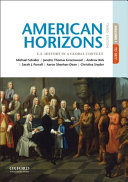
American Horizons
By - Michael Schaller
Floor
-
Floor 4
Published
-
Oxford University Press, New York, ©2013
ISBN 10 - 0190659483
ISBN 13 - 9780190659486
Book Status
-
1 Qnty Available with us.
Subject
-
United States
Shelf No
-
5
Call Number
-
973 MIC
Notes
-
Includes Index